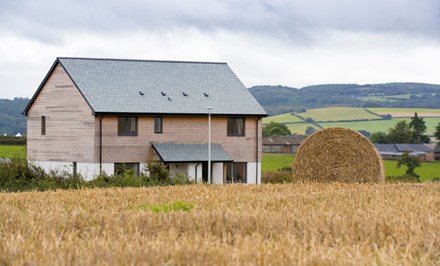Hastoe has joined a coalition of rural partners to call for all political parties to support "A Manifesto for Delivering Thriving Rural Communities Through Affordable Housing".
The Manifesto provides a comprehensive blueprint for tackling the acute shortage of affordable housing in rural England. It also highlights the inequality between urban and rural areas.
While 17% of housing in urban areas is considered to be affordable, this percentage falls to only 9% in rural areas, creating social inequality and hindering economic growth.
The benefits of providing more affordable rural housing aren't simply limited to those who live in the homes. The construction of just ten affordable homes can generate a £1.4 million boost to the local economy, support 26 jobs, and yield approximately £250,000 in net returns for the Treasury. Affordable rural homes don't just provide shelter, they are a catalyst for vibrant, resilient communities that can grow and contribute to national goals of green growth, nature recovery, and food security.
Develop a long-term strategy for scaling up and delivering a national programme of affordable rural house building.
In villages across England, small scale schemes of well-designed affordable housing are transforming rural communities, helping them to thrive and become resilient.
They provide safe, high-quality homes for those unable to buy or rent in the open market. Because of these homes, local households now have the opportunity to be part of the community where they want to live, whether it’s for work, to be close to family and support network or simply to be rooted in their community.
The benefit of these homes goes well beyond individuals, they invigorate local economies, fostering growth and stability. The residents are often the essential workers on which local rural life depends – teachers shaping young minds, care workers aiding the elderly and vulnerable, a local workforce that sustains village pubs, shops, and farms. They are the lifeblood of existing businesses and the
employees of new enterprises that will deliver nature recovery, sustainable food and the transition to a green economy.
This organic growth in villages makes them diverse and inclusive places of opportunity. The Manifesto lays out the small number of targeted steps, that will make this a reality that could be shared by rural communities across the country.
Immediate actions
- Implement government policy provisions to reduce the size threshold for affordable homes on small sites across rural
England. - Require local authorities, including mayoral and combined authorities, to assess and document the specific housing needs
in their rural communities and devise targeted policies and strategies to address them. - Accelerate delivery through Rural Exception Sites by enhancing national planning policy and guidance.
- Provide a Capital Gains Tax exemption for land designated as a Rural Exception Site and land sold to registered providers.
- Establish an annual fund of approximately £2.6 million to sustain a national network of Rural Housing Enablers.
- Protect the current and future availability of rural affordable homes by exempting them from Right to Buy in smaller rural
communities. - Ensure that a minimum of 10% of funding from Homes England or future investment bodies is dedicated to rural affordable
housing, ensuring genuine affordability. - Review Local Housing Allowance levels annually so that rural rents are affordable for low-income households.
- Pledge to adapt homelessness and rough sleeping strategies to rural areas, focusing on prevention and using enhanced
data collection to uncover hidden needs, while introducing new, multidisciplinary support services in rural communities.
Making the case for action
- Affordable rural housing projects may be small in scale but yield major benefits, contributing significantly to community
investment and economic prosperity. Building just ten such homes can provide a £1.4m economic boost, support 26 local
jobs, and secure a net return of around £250k for the Treasury, before considering other local multiplier effects. - The rural housing crisis is fuelled by a mix of low local incomes, high housing costs due to external demand, and a limited
affordable housing supply. With affordable housing constituting only 9% in villages compared to 17% in urban areas, the
disparity is striking. - Housing sites in rural areas are small and limited in supply. Local planning authorities should be able to secure affordable
housing on all sizes of site, with the added benefit of opening up opportunities for SME builders. - As there are challenges in achieving economies of scale, housing associations often rely on low-cost Rural Exception
Sites and a steady, flexible grant programme from Homes England to ensure financial viability. - Workplace incomes in rural areas are lower than in urban areas, but housing costs are higher. In consequence Affordable
Rent, charged at up to 80% of market rents is often unaffordable. - The rise of homelessness in rural England is alarming. Beyond the scarcity of affordable housing, factors like isolation, a lack of support services, and inadequate transportation exacerbate the issue. It's crucial now more than ever for both local and national governments to proactively address and prevent rural homelessness in all its forms.
- The dearth of affordable homes in rural communities is directly linked to the sales of affordable homes through Right to Buy which have not been replaced. New development opportunities are already limited, exacerbated by landowners’ reluctance to sell land at the required price if they fear affordable homes might later be sold on the open market.
- Rural Exception Sites are often the only route to meet housing needs in rural communities, but their delivery has halved over the past five years and is focussed in five local authority areas. This decline is exacerbated by the loss of Rural Housing Enablers, who are essential in supporting communities, landowners, local authorities, and housing associations deliver these sites.
- Local Housing Allowance rates are set across urban and rural areas which means they are often insufficient to cover higher rural rents, leaving a gap that many rural working residents find difficult to fill.
By understanding and addressing these challenges, the strategy aims to make the countryside a viable, inclusive, and attractive living option, enriched with opportunities for all.
-
A Manifesto For Delivering Thriving Rural Communities Through Affordable Housing
Size: 590Kb Type: PDF




